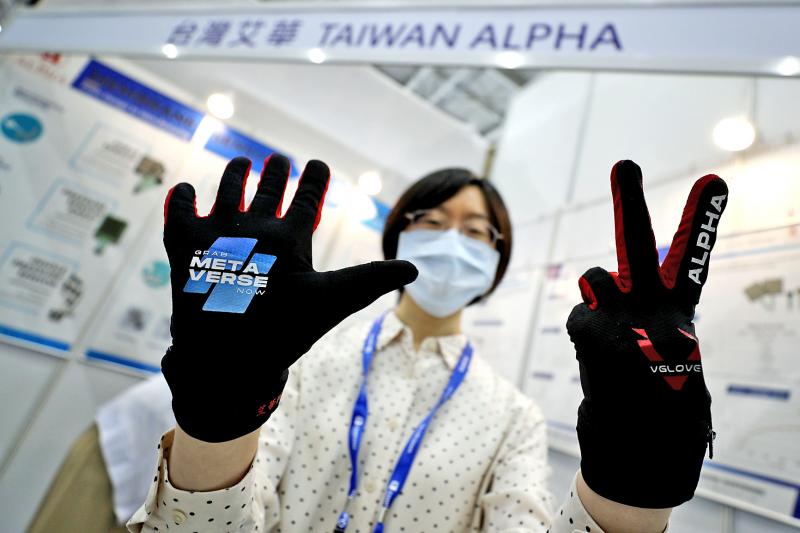The Ministry of Economic Affairs yesterday said it would offer higher tax incentives for research and development (R&D), and for advanced equipment investment for local firms that are important links in global supply chains, such as semiconductor companies.
The ministry plans to raise tax benefits for companies’ R&D efforts to a 25 percent rebate on costs, compared with 15 percent currently, it said in a statement.
The ministry also plans to eliminate a tax deduction limit of NT$1 billion (US$33.63 million) on newly acquired advanced equipment, it said, adding that the 5 percent limit on overall new equipment spending is to remain unchanged.

Photo: Ritchie B. Tongo, EPA-EFE
The ministry said it expects the legislature to pass the measures, which would be added to the Statute for Industrial Innovation (產業創新條例), by the end of the year.
The move comes as the world’s major economies — including the EU, Japan, South Korea and the US — plan tax incentives and substantial subsidies to bolster key components and semiconductor supply chains at home, as supply chain resilience becomes a national security issue for some nations, the ministry said.
The US seeks to push through the Creating Helpful Incentives for Producing Semiconductors for America Act to pump US$52 billion in subsidies for making semiconductors in the US, while the EU also plans to spend about 11 billion euros by 2030 to fund the development of semiconductor research, design and manufacturing capabilities, the ministry added.
Taiwan Semiconductor Manufacturing Co (台積電) has received a subsidy of ¥400 billion (US$3.01 billion) from the Japanese government to build a new fab in Kumamoto Prefecture, the ministry said, adding that the chipmaker is also expecting to receive US subsidies for its new fab in Arizona.
“With countries around the world striving to achieve independence on key component supply, their actions could undermine the existing partnerships [with Taiwan], or bring new competitors,” the ministry said.
Such development “could further diminish the nation’s role in global supply chains,” it added.
To keep up with the incentives being offered in other countries, the “government should add new tax incentives to help strategically important local industries enhance their competitiveness,” the ministry said.
Tax relief and subsidies are being offered at home to safeguard Taiwan’s global role in the semiconductor, electric vehicle and 5G industries, the ministry said.

SEASONAL WEAKNESS: The combined revenue of the top 10 foundries fell 5.4%, but rush orders and China’s subsidies partially offset slowing demand Taiwan Semiconductor Manufacturing Co (TSMC, 台積電) further solidified its dominance in the global wafer foundry business in the first quarter of this year, remaining far ahead of its closest rival, Samsung Electronics Co, TrendForce Corp (集邦科技) said yesterday. TSMC posted US$25.52 billion in sales in the January-to-March period, down 5 percent from the previous quarter, but its market share rose from 67.1 percent the previous quarter to 67.6 percent, TrendForce said in a report. While smartphone-related wafer shipments declined in the first quarter due to seasonal factors, solid demand for artificial intelligence (AI) and high-performance computing (HPC) devices and urgent TV-related orders

BYPASSING CHINA TARIFFS: In the first five months of this year, Foxconn sent US$4.4bn of iPhones to the US from India, compared with US$3.7bn in the whole of last year Nearly all the iPhones exported by Foxconn Technology Group (富士康科技集團) from India went to the US between March and last month, customs data showed, far above last year’s average of 50 percent and a clear sign of Apple Inc’s efforts to bypass high US tariffs imposed on China. The numbers, being reported by Reuters for the first time, show that Apple has realigned its India exports to almost exclusively serve the US market, when previously the devices were more widely distributed to nations including the Netherlands and the Czech Republic. During March to last month, Foxconn, known as Hon Hai Precision Industry

Taiwan Semiconductor Manufacturing Co (TSMC, 台積電) and the University of Tokyo (UTokyo) yesterday announced the launch of the TSMC-UTokyo Lab to promote advanced semiconductor research, education and talent development. The lab is TSMC’s first laboratory collaboration with a university outside Taiwan, the company said in a statement. The lab would leverage “the extensive knowledge, experience, and creativity” of both institutions, the company said. It is located in the Asano Section of UTokyo’s Hongo, Tokyo, campus and would be managed by UTokyo faculty, guided by directors from UTokyo and TSMC, the company said. TSMC began working with UTokyo in 2019, resulting in 21 research projects,

Quanta Computer Inc (廣達) chairman Barry Lam (林百里) yesterday expressed a downbeat view about the prospects of humanoid robots, given high manufacturing costs and a lack of target customers. Despite rising demand and high expectations for humanoid robots, high research-and-development costs and uncertain profitability remain major concerns, Lam told reporters following the company’s annual shareholders’ meeting in Taoyuan. “Since it seems a bit unworthy to use such high-cost robots to do household chores, I believe robots designed for specific purposes would be more valuable and present a better business opportunity,” Lam said Instead of investing in humanoid robots, Quanta has opted to invest